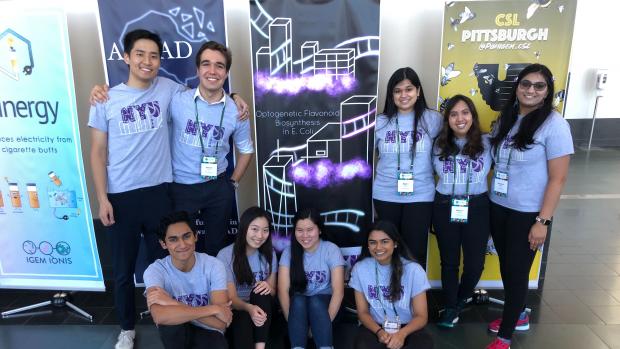NYU iGEM brings home a silver

A Tandon VIP team won silver at the 2019 International Genetically Engineered Machine (iGEM) Competition, the world’s premier synthetic biology contest.
When laypeople hear the name “E. coli,” many will think immediately of food poisoning or terrible gastric distress, but in reality, most types of E. coli are harmless and even serve to help keep the human digestive tract healthy.
A group of students recently employed the oft-misunderstood bacteria in a project that garnered them a silver medal at the 2019 International Genetically Engineered Machine (iGEM) Competition, the world’s premier synthetic biology contest, which draws hundreds of teams from around the globe each year to create novel biological systems. (At the beginning of the competition season, each team is given a kit of more than 1,000 standard interchangeable parts called BioBricks from the Registry of Standard Biological Parts; they then call upon their knowledge of molecular biology techniques and engineering concepts to create a genetically engineered system and operate it in living cells in order to address a real-world problem.)
Part of Tandon’s Vertically Integrated Projects (VIP) initiative, the iGEM team decided to tackle the issue of producing flavonoids in an efficient, cost-effective way.
Flavonoids — found naturally in fruits, vegetables, and other plants — are known to exhibit a wide range of health-related benefits because of their anti-oxidative, anti-inflammatory, anti-mutagenic, and anti-carcinogenic properties. Plants, however, take a long time to grow and require sunlight, water, and nutrients, and even after they’re grown, extracting flavonoids can be expensive and time consuming.
The team’s solution was to insert DNA into E. coli, which is relatively easy to engineer and behaves predictably, so that it could produce flavonoids, thereby simultaneously reducing the time needed for synthesis and increasing yields over what might naturally be obtained by plant extraction. Team members — whose majors include biotechnology, biomolecular science, and chemical and biomolecular engineering, among others — constructed a fully functioning bioreactor and employed optogenetics, which has been used in recent years as a way to signal cells with light. Combining it with metabolic engineering, which usually relies on chemical inducers to activate gene expression, results in more efficient and precise activation of target genes, as the team found.
“My favorite part of working on the project was getting to see the gene circuit and engineering work come together after the troubleshooting process to test the bioreactor,” chemistry major Neelam Pandya said, while Malini Basu, who is studying biomolecular science, asserted, “The best part of NYU iGEM is that a diverse team of students from a variety of academic backgrounds came together to successfully build a meaningful project from the ground up.”
Senior Michelle Lam found working on a VIP project to be an educationally rich and rewarding experience. “Learning how to troubleshoot our failed experiments was both gratifying and humbling,” she admitted. “We grew as a group, and I think NYU iGEM will continue to be a team to watch in the future.” David Sung, an instrumental member of the bioreactor portion of the project, concurs. “The VIP programs offer a creative space for students to collaborate on ideas in order to accomplish something great and to meet amazing people in the process,” he said.
Sung is now looking forward to the next competition. “It was a surreal experience to finally see our project come to life, and it was not until the very end when I was able to truly appreciate all of the hard work that went into it,” he said. “The positive feedback that we received from the judges, the audience, and students from other iGEM teams not only gave me a sense of pride, but also gave me the motivation to work harder for the next time!”
Kelly Huang, one of the team’s founding leaders, points out that even though medals are awarded at the competition, a sense of camaraderie and common purpose pervaded the event. “iGem does not encourage a cut-throat mentality,” she said. “Synthetic biology has the potential to solve so many problems, and that’s what we’re all working to do.”
She applauded Professors Jack Bringardner and Peter Voltz, who oversee the VIP program; Professor Jin Ryoun Kim, who advises the iGEM team; and Dean Jelena Kovačević, who has been an avid supporter of the entire VIP initiative. “We performed as well as we did at the competition in large part because we had so much support and so many resources to count on,” she explained.
Team Roster
- Kaavya Ashok
- Malini Basu
- Adler Guerrero
- Ali Hasan
- Kelly Huang
- Steven Ionov
- Michelle Lam
- Neelam Pandya
- David Sung




